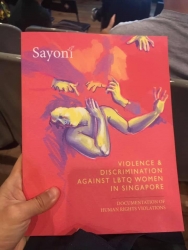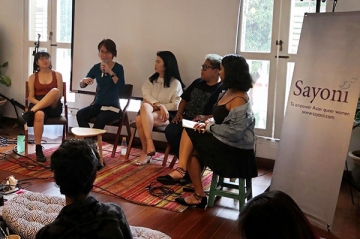Women are not difficult creatures, making their relationships harder to work out. It’s external factors that are aggravating what is already an amazing feat- making relationships work. I can see some of you wondering “Are you sure it is difficult to make relationships work? My parents and grandparents have been married for gazillion years!”
That pushes us to the next question: What does it mean when we say “making a relationship work”? Someone popped this question at the forum: what is the average duration of a lesbian relationship? This is a legitimate question and the answer given was about 7 years (according to my memory).
Now i am extremely curious- what are we using “duration of the average lesbian relationship” as a measure of? Does quantity imply quality? But first of all, let’s examine this implicit claim that long-lasting lesbian relationships are close to extinction.
Few KNOWN relationships hit the decade and beyond. We know that older lesbians, as compared to younger lesbians, have a greater probability of staying together. I think we need to keep in mind that older lesbians are not particularly prominent in our English-driven, internet-facilitated community. Thus, long-lasting lesbian relationships are effaced from our sight. Just because we don’t see them does not mean they don’t exist. [And yes, someone did talk about bringing these hokkien-speaking or cantonese-speaking women back into the community. Anyone wanna start this effort off?]
Back to my first question: Quantity = Quality? And this is what i mean when i say “making relationships work”- Quality is the key. Without quality, quantity is meaningless. Now, i am not saying that the length of a relationship is not important. I am saying that the quality of a relationship is far more important than the length of it. Just because two persons are legally married (i.e. the government says they are having a relationship) doesn’t mean they are having a relationship. The length of a relationship, alone, is an extremely poor and misleading indicator of relationship quality. In the past, divorce rates are very low. It doesn’t mean that most couples of yester-years were in mutually supportive, respectful, loving healthy relationships. In fact, we know that till today, many women were abused one way or another (e.g. verbal abuse, infidelity). Why do they remain with their partners? They were disempowered, without access to alternative routes (or persons).
That of two persons remaining together is only truly glorious when both parties are able to step out of the relationship and yet choose to be together. That’s love that binds… not because “I don’t have the money to support myself”, “I may not be able to find someone else better” or “The separation procedures are a hassle” etc and hence two persons stay together. Think of the “3 year separation before divorce” thing and you get what i mean.
I guess what i am really trying to say is: lesbians in the circle are generally mobile and independent. Without the encumbrance of law, it is not surprising that we observe what we see today. [Recall again that the older generation lesbians are not part of this known circle.] Leave the straight, independent people out of law, and you will see similar patterns- this i am quite certain.
So, when we talk about lesbian relationships, let’s not disempower ourselves further. Let’s keep in mind the various factors that contribute to what we see. Are hindrances inherent or externally imposed upon lesbian couples? From what sample do we derive our conclusion on the longevity of lesbian relationships? In knowing these, we can dedicate efforts towards combatting problems (recall from above identity-conflict and fear of societal pressure).
I am not saying the problem is trivial… I am saying the problem isn’t as big as we make it out to be. What’s your say?




Comments
sushila said,
February 14, 2007 at 8:07 pm
Absolutely agree with you. I think many lesbian militants out there don’t want us to see the real picture. I’ll leave out names for this one but you know who you are!
ed said,
February 14, 2007 at 9:33 pm
I suppose we can say that lesbian relationships are fundamentally different from heterosexual relationships. The historical tradition of heterosexual relationships embody the partnering of both the masculine and feminine. Lesbian relationships, however, embody the partnering of feminine with feminine. Given that the feminine persona is more relationship based as opposed to the masculine ‘activity’-based perspective, this bodes well for the development of the relationship into a deep and meaningful one.
The difference between L and H relationships can however be narrowed if men become more like women – that is, that they become androgenous in perspective. Thus, i view as unfortunate that women, in their quest for equality, pick up masculine traits instead of making men more like women.(no, i’m not a woman – though i scored high marks in both masculine and feminine traits in a psychological study when i was in the uk.)
Great site by the way. Much stimuli for thought. Tis too bad ‘Vox’ does not allow external links other than links to ‘vox’ blogs. Talk about ‘nationalising’ bloggers. Tch!)
AnJ said,
February 16, 2007 at 11:52 am
Thank you for your comments, sushila and ed!
I think many lesbians believe that they are a composite of both masculine, feminine and androgynous traits etc. And wouldn’t like the idea that they have more feminine traits than others. Sometimes i think people define what’s feminine, what’s masculine according to traditional roles of women and men.
Certainly, noone would dispute that many lesbians (if not most) are relationship-oriented compared to their male counterparts. Hence obvious general patterns in this community.
I think people don’t just “pick up” masculine or feminine traits… and that we cannot just “make” people do so. Somehow i believe that people take up traits that they see as congruent with themselves. So how they behave is an expression of what they are- as long as they are comfortable doing so. Women picking up masculine traits for the sake of equality seems to be a past feminist movement- decades back!!! I assure you that this is no longer the case. (I am speaking generally.) So, current day masculine women are not masculine for the sake of the feminist cause. Rather, they are masculine… simply because they are.
pleinelune said,
February 16, 2007 at 4:38 pm
I would concur with Anj, and I would say the third-wave feminist movement puts feminine traits as the path to equality, not masculine. Self-empowerment.
jean said,
February 16, 2007 at 6:15 pm
Third Wave is also known as the after-effects of the second wave’s inability to resolve their issues. Some think that third wave is trash and women who believes in it deluded.
rabbit06 said,
February 16, 2007 at 9:58 pm
I agree. I think that just because lesbian relationships are not bounded by a legal institution doesn’t mean that there is any less of a desire to make things last. It just means that there is a greater sense of independence/ freedom for us.
jack said,
August 14, 2007 at 6:27 am
i reckon lesbiens are the hottest thing in the world and im only 11
Throughout the world, there are sisters suffering like you. I cannot change this situation, but hope that time will bring a change to your mother’s thinking. What can I offer? My heart has all the good intentions so I am sharing my thoughts with you.
-Your mother gave you life – thank her, but give “LIFE” to yourself. Close your eyes and mentally give life to yourself – a new life, filled with joy, hope, courage and expectations of great things to come. Now, you are the ‘new mother’ of you.
. You are beautiful, unique and a glorious person in your creation. There is not another (insert your name) in the universe - you are unique and precious. Imagine your dreams - Create your Happiness - Live Your Life Fully!
-Who around you is a “Mother” to you? ]
-Acceptance of Things That Cannot Change (or Need Time to Change)While you may not understand your mother, there has to be peace within you.
-This is Your Life: We cannot live our lives ruled by anyone – mothers included!!
Our ego often exhibits itself as a “needy child” – When things go wrong, we often want ‘our mommy.’
Societies are Changing: Now, in 2013, fourteen countries have accepted gay marriage.
ers; we are your family.
Hugs from Canada.
Paula.
stories4hotbloodedlesbians.com
RSS feed for comments to this post